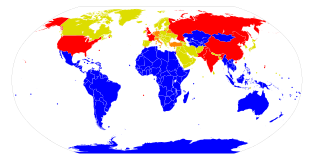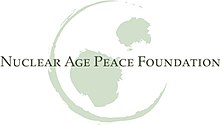
The Treaty on the Non-Proliferation of Nuclear Weapons, commonly known as the Non-Proliferation Treaty or NPT, is an international treaty whose objective is to prevent the spread of nuclear weapons and weapons technology, to promote cooperation in the peaceful uses of nuclear energy, and to further the goal of achieving nuclear disarmament and general and complete disarmament. Between 1965 and 1968, the treaty was negotiated by the Eighteen Nation Committee on Disarmament, a United Nations-sponsored organization based in Geneva, Switzerland.

Nuclear proliferation is the spread of nuclear weapons, fissionable material, and weapons-applicable nuclear technology and information to nations not recognized as "Nuclear Weapon States" by the Treaty on the Non-Proliferation of Nuclear Weapons, commonly known as the Non-Proliferation Treaty or NPT. Proliferation has been opposed by many nations with and without nuclear weapons, as governments fear that more countries with nuclear weapons will increase the possibility of nuclear warfare, de-stabilize international or regional relations, or infringe upon the national sovereignty of nation states.

Nuclear disarmament is the act of reducing or eliminating nuclear weapons. Its end state can also be a nuclear-weapons-free world, in which nuclear weapons are completely eliminated. The term denuclearization is also used to describe the process leading to complete nuclear disarmament.
Arms control is a term for international restrictions upon the development, production, stockpiling, proliferation and usage of small arms, conventional weapons, and weapons of mass destruction. Historically, arms control may apply to melee weapons before the invention of firearm. Arms control is typically exercised through the use of diplomacy which seeks to impose such limitations upon consenting participants through international treaties and agreements, although it may also comprise efforts by a nation or group of nations to enforce limitations upon a non-consenting country.

International Physicians for the Prevention of Nuclear War (IPPNW) is a non-partisan federation of national medical groups in 63 countries, representing doctors, medical students, other health workers, and concerned people who share the goal of creating a more peaceful and secure world free from the threat of nuclear annihilation. The organization's headquarters is in Malden, Massachusetts. IPPNW was awarded the Nobel Peace Prize in 1985.

Legality of the Threat or Use of Nuclear Weapons[1996] ICJ 3 is a landmark international law case, where the International Court of Justice gave an advisory opinion stating that while the threat or use of nuclear weapons would generally be contrary to international humanitarian law, it cannot be concluded whether or not such a threat or use of nuclear weapons would be lawful in extreme circumstances where the very survival of a state would be at stake. The Court held that there is no source of international law that explicitly authorises or prohibits the threat or use of nuclear weapons but such threat or use must be in conformity with the UN Charter and principles of international humanitarian law. The Court also concluded that there was a general obligation to pursue nuclear disarmament.
A nuclear weapons convention is a proposed multilateral treaty to eliminate nuclear weapons. This might include prohibitions on the possession, development, testing, production, stockpiling, transfer, use and threat of use of nuclear weapons, such as those in the Treaty on the Prohibition of Nuclear Weapons, along with provisions for their verified elimination. It could be similar to existing conventions outlawing other categories of weapons, such as biological weapons, chemical weapons, anti-personnel mines and cluster bombs.

United Nations Security Council resolution 1540 was adopted unanimously on 28 April 2004 regarding the non-proliferation of weapons of mass destruction. The resolution establishes the obligations under Chapter VII of the United Nations Charter for all member states to develop and enforce appropriate legal and regulatory measures against the proliferation of chemical, biological, radiological, and nuclear weapons and their means of delivery, in particular, to prevent the spread of weapons of mass destruction to non-state actors.
The Hiroshima-Nagasaki Protocol is a proposed protocol complementary to the Treaty on the Non-Proliferation of Nuclear Weapons (NPT) being championed by the Mayors for Peace 2020 Vision Campaign gathering the support of local authorities and civil society actors all over the world. It seeks to challenge national governments to follow through on the commitments they made in Article VI the Treaty. In this Article, the parties undertake to pursue "negotiations in good faith on effective measures relating to cessation of the nuclear arms race at an early date and to nuclear disarmament", and towards a "Treaty on general and complete disarmament under strict and effective international control". The Hiroshima–Nagasaki Protocol calls on the States Parties to the Treaty to live up to this "good faith" agreement. It challenges them to adopt an overarching approach to nuclear disarmament, rather than the go-nowhere-slowly step-by-step approach. It challenges the nuclear-weapon states to show good faith through unilateral reciprocal actions. Furthermore, it challenges the States Parties to adopt a legal-binding document, rather than the past political-pledges ignored or undermined by some of the nuclear-weapon States Parties in the past.
The 13 steps are identified in a paragraph of the Final Document of the 2000 Review Conference of the Nuclear Non-Proliferation Treaty, providing a set of 'practical steps for the systematic and progressive efforts to implement Article VI of the Treaty on the Non-Proliferation of Nuclear Weapons'. Article VI is the part of the Treaty that provides for disarmament, including nuclear disarmament.

United Nations Security Council Resolution 1887, adopted unanimously on 24 September 2009, the Council addressed non-proliferation and the prevention of the spread of weapons of mass destruction in the world.

International Atomic Energy Agency (IAEA) Safeguards are a system of inspection and verification of the peaceful uses of nuclear materials as part of the Nuclear Non-Proliferation Treaty (NPT), supervised by the International Atomic Energy Agency.

In United Nations Security Council resolution 984, adopted unanimously on 11 April 1995, the council gave assurances to non-nuclear weapon states that were parties to the Nuclear Non-Proliferation Treaty (NPT) against the threat of nuclear proliferation.

Iran convened a conference titled "International Disarmament and Non-proliferation: World Security without Weapons of Mass Destruction" on 17 and 18 April 2010 in Tehran. The theme of the conference was Nuclear Energy for All, Nuclear Weapons for No One.
The 2010 Review Conference for the Treaty on the Non-Proliferation of Nuclear Weapons (NPT) was held at United Nations Headquarters in New York City from 3 to 28 May 2010. The President of the Review Conference is Ambassador Libran N. Cabactulan of the Philippines. UN Secretary-General Ban Ki-moon used the opening of the conference to note that "sixty five years later, the world still lives under the nuclear shadow".
A security assurance, in the context of nuclear warfare, is an expression of a political position by a nuclear-armed nation intended to placate other non-nuclear-armed nations. There are two types of security assurance: positive and negative. A positive assurance states that the nation giving it will aid any or a particular non-nuclear-armed nation in retaliation if it is a victim of nuclear attack. A negative assurance is not the opposite but instead means that a nuclear-armed nation has promised not to use nuclear weapons except in retaliation for a nuclear attack against itself.

The Middle East nuclear weapon free zone (MENWFZ) is a proposed agreement similar to other nuclear-weapon-free zones. Steps towards the establishment of such a zone began in the 1960s led to a joint declaration by Egypt and Iran in 1974 which resulted in a General Assembly resolution. Following the 1995 NPT Review Conference, the International Atomic Energy Agency (IAEA) held a series of meetings involving experts and academics to consider ways to advance this process.
Thomas Graham Jr. is a former senior U.S. diplomat. Graham was involved in the negotiation of every single international arms control and non-proliferation agreement from 1970 to 1997. This includes the Strategic Arms Limitation Talks, the Strategic Arms Reduction Treaties, the Anti-ballistic missile (ABM) Treaty, Intermediate-Range Nuclear Forces Treaty (INF) Treaty, Treaty on the Non-Proliferation of Nuclear Weapons Treaty (NPT), Treaty on Conventional Armed Forces in Europe (CFE) Treaty and Comprehensive Nuclear-Test-Ban Treaty (CTBT). In 1993, Ambassador Graham served as acting director of the Arms Control and Disarmament Agency (ACDA) from January to November, 1993 and Acting Deputy Director from November, 1993 to July, 1994. From 1994 through 1997, he was president Bill Clinton's special representative for Arms Control, Non-Proliferation, and Disarmament. Graham successfully led the U.S. government efforts to achieve the permanent extension of the NPT in 1995. Graham also served for 15 years as the general counsel of ACDA. Throughout his career, Thomas Graham has worked with six U.S. Presidents including Presidents Richard Nixon, Gerald Ford, Jimmy Carter, Ronald Reagan, George H. W. Bush, and Bill Clinton. Ambassador Graham worked on the negotiation of the Chemical Weapons Convention and the Biological Weapons Convention and managed the Senate approval of the ratification of the Geneva Protocol banning the use of chemical and biological weapons in war, as well as the Biological Weapons Convention.

The Treaty on the Prohibition of Nuclear Weapons (TPNW), or the Nuclear Weapon Ban Treaty, is the first legally binding international agreement to comprehensively prohibit nuclear weapons with the ultimate goal being their total elimination. It was adopted on 7 July 2017, opened for signature on 20 September 2017, and entered into force on 22 January 2021.










